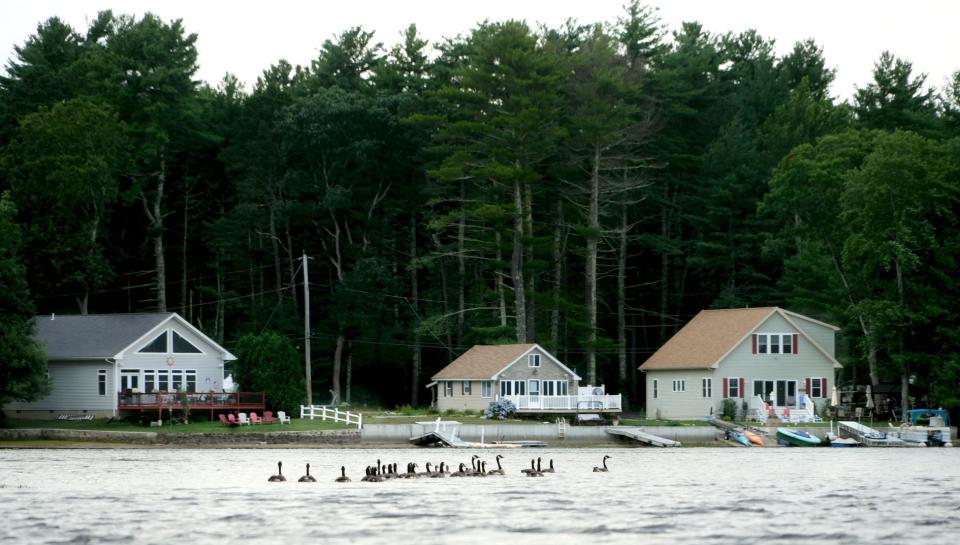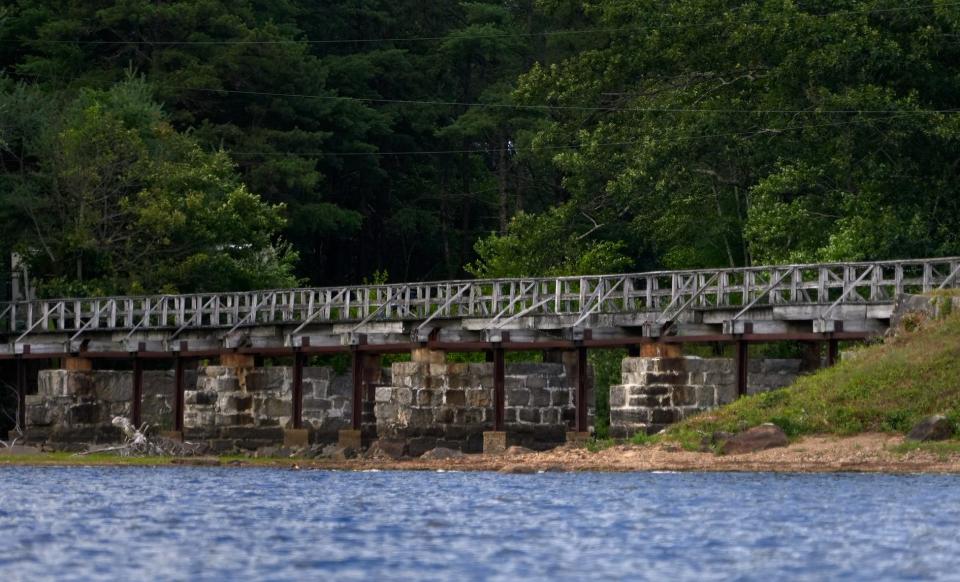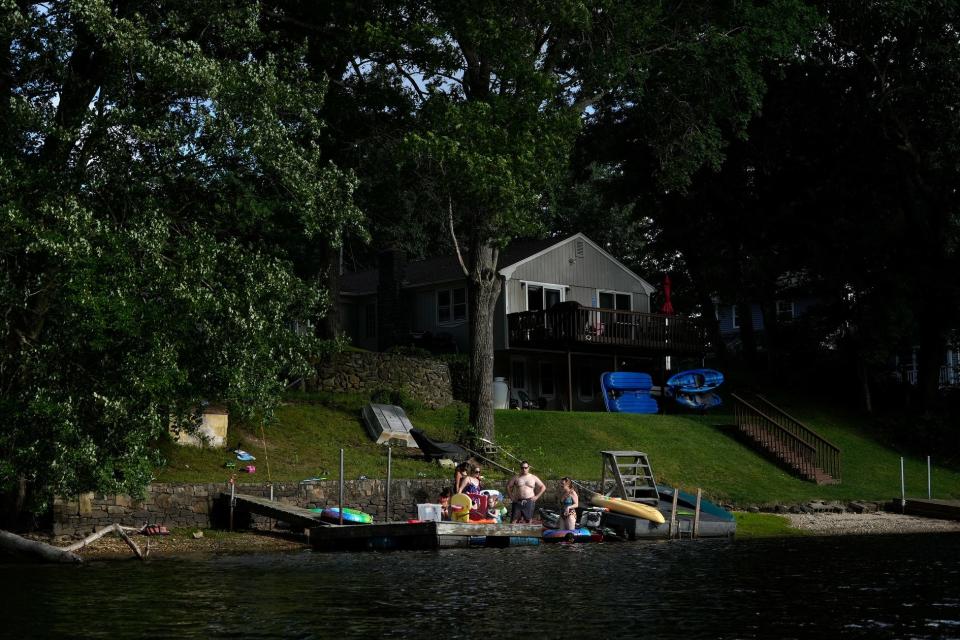'This isn't over': Why Coventry seized Johnson's Pond, and what comes next
COVENTRY – The Fourth of July felt different this year on Johnson's Pond, a man-made reservoir ringed by lakeside cabins and docks.
Low water levels kept people from boating and water-skiing, and the Johnson's Pond Civic Association called off its much-anticipated fireworks display.
But the mood was jubilant, with plenty of homeowners lighting sparklers and Roman candles of their own.
The reason? A week before, the Town of Coventry, in an unusual step, seized the 950-acre pond by eminent domain to settle a bitter, years-long feud with its owners. On June 28 – "Johnson's Pond Independence Day," some residents joked – town officials grabbed bolt cutters, cut open the locks to the dam's gate and forced open the doors.
"It needed to be done," said Jonathan Pascua, who serves on the Town Council and lives on Johnson's Pond. "It was something that was just going to be litigated until the end of time."

But even before the last fireworks fizzled out, townspeople had questions.
Why was Coventry taking responsibility for a broken dam when the town can't even pick up the trash?
And when will people who don't own a boat or a lakefront home get to benefit from the town's takeover, given that they currently lack any meaningful access to the pond?
Popular pond belonged to private corporation
Though now synonymous with water-skiing competitions and pontoon boats, Johnson's Pond wasn't originally a place of leisure. It was created in 1873 to fuel the giant, humming factories that lined the Pawtuxet River, churning out cotton and textiles.
Worried that the river ran too low in summer to guarantee a steady supply of power, a conglomerate of mill owners dammed one of the upper branches, turning it into the Flat River Reservoir – known colloquially as Johnson's Pond.
It didn't take long, however, for recreational fishermen to discover that the artificial lake – one of the largest inland bodies of water in Rhode Island – was an excellent place to catch pickerel and bass.
Its sandy beaches became a popular destination for picnics. Summer cottages soon began popping up along the roughly 17 miles of wooded shoreline.
As the downstream textile mills declined, the cabins boomed, growing larger and more numerous. But the Quidnick Reservoir Company, which was responsible for creating Johnson's Pond, still clung tight to the water-flow rights.
"What none of these people realize is that the reservoir company owns the pond," Henry Breton, the dam's gatekeeper, told The Providence Journal in 1972. "If they want to drain the whole thing, they can, and these people will have nothing to say about it."
Dead turtles and dry docks
Those words proved prophetic in 2020, when a company called Soscia Holdings LLC purchased the pond, dam and water-flow rights that had belonged to Quidnick since the Industrial Revolution.
Owners of the roughly 700 homes around Johnson's Pond were soon complaining that the new owners routinely released too much water from the reservoir, turning it into a shallow mud puddle. Piers sat uselessly on its silty bottom, next to grounded boats and Jet Skis. Algae blossomed, reportedly killing fish and turtles.
Political Scene: School's in for summer: These are the topics lawmakers will be 'studying' in the offseason
Soscia Holdings, run by Coventry resident Douglas Soscia, along with his father and brother, insisted that water was being released for safety reasons ahead of forecast rains. But many suspected other motivations.
"The play was, 'I’m going to lower the water levels to the point where those of you who live around here can’t really use this water,'" said Town Council President Hillary Lima. "And then the hope was that the folks who live around the water would get so frustrated that they would bang down the doors of Town Hall and say, 'We want our summers back. Pay this guy whatever he’s asking.'"
At one point, Lima said, Soscia Holdings offered to sell the pond and the dam to the town for $100 million – considerably more than the $1.7 million they paid for it back in 2020. The town didn't bite.

The idea that the Soscias were out to extort the Town of Coventry is "nothing but false," said Patrick Dougherty, the attorney for Soscia Holdings.
His clients purchased the property with the intent of building lakefront homes, he said, but had numerous other opportunities to cash in on the pond and its water-flow rights, such as using it for a marina or hydropower.
"The town gets an enhanced value of $96 million per year as a result of the pond being here," he said. "I don't think it’s so far-fetched to allege the property is very, very valuable."
Lakefront homeowners apply pressure
Conservative-leaning Coventry isn't typically the sort of place where people are clamoring to seize private property through eminent domain.
"I don't think the Town of Coventry has ever used that power in its history, since 1741," Pascua said.
But when they saw how their property values could dry up along with Johnson's Pond, lakefront homeowners loudly demanded that the government step in.
Elsewhere in Rhode Island, and all over the country, dams are being removed so rivers can be restored to their natural states. Johnson's Pond residents nonetheless made the case that draining the reservoir was harmful to the environment, and they succeeded in getting the General Assembly to pass a law in 2022 that gave the Department of Environmental Management authority to make sure the water remained at historical levels.
It didn't make much of a difference: Soscia Holdings racked up six figures in fines for allegedly failing to comply while simultaneously trying to get the law overturned in court.
More: Providence scrapyard ordered to close temporarily after two fires. What comes next?
For decades, residents were allowed to use the pond for recreation, and the town maintained the dam and paid for its upkeep through its lease with Quidnick. After Soscia Holdings took over, they took Coventry to court, arguing that the town hadn't held up its end of the bargain.
In January, Soscia informed Coventry that he wouldn't renew the lease. All boats, moorings and piers had to be removed, and even the town's dog pound needed to go.
Then, as March turned to April, several things happened all at once. A federal judge ruled against Soscia Holdings' lawsuit. The town's lease expired. And it became clear that the dam was in bad shape.
Jets of water were spurting from gaps in the stone wall of the dam's spillway, which is supposed to prevent the reservoir water from rushing downstream.

Exactly who's to blame – and whether it was reckless for Soscia to attempt to bolster the wall with boulders from the riverbed – is still a matter of fierce debate. But if both sides agree on one thing, it's that something needed to be done.
"This isn’t just about recreational use," Lima said. "There's an entire ecosystem and communities that live downstream that also had concerns about what was going on with this dam."
Visions of public access, but a long road ahead
In June, the Coventry Town Council voted unanimously to condemn the pond, the dam and about 30 acres of neighboring land and take it by eminent domain.
Under the arrangement, which was approved by Superior Court Judge Richard Licht, Soscia Holdings will hold on to 69 acres of developable land and receive $157,000 in compensation.
"How do you live with yourself if something happens and people die?" said Pascua, who did not vote on the condemnation. "If the Department of Energy was watching a private company operate a nuclear reactor erratically, they wouldn't just let them do it because it was theirs. They would step in."
The legal wrangling isn't over yet: Dougherty said there is "no doubt" that Soscia Holdings will be seeking additional compensation, and Coventry "grossly undervalued" the property that it took.
In any case, Coventry now owns Johnson's Pond outright.
Legally, the town couldn't seize the property unless there were a public benefit. That means there will need to be public access, which was one of the goals all along, Pascua said.
As it stands, public access is "very limited and not really meaningful," he said.
He envisions creating a public park with amenities such as a beach pavilion, boat ramp or fishing pier. But that could be a long way off. First, the town has to fix the broken dam – and figure out how to pay for it.
"I'm not waving pom-poms just yet," Lima said. "This isn't over."
What happens now?
Things aren't back to normal at Johnson's Pond. Because of the damage to the dam, the DEM has ordered Coventry to keep water levels lower than usual until it can be fixed, which means that some areas of the reservoir are usable but others aren't – and some residents still can't put their piers in the water.

"The intent of the town is to try to give people a summer to use it," Lima said. "I just ask folks to be patient as we make the immediate repairs we need to make and as we get our feet under us in terms of managing this newly acquired asset."
And while Johnson's Pond residents may be impatient to get back in the water, they represent a small and relatively well-off segment of the town's roughly 36,000 residents, many of whom have never set foot there.
Amid an ongoing "trash meltdown," some residents are waiting weeks to have recycling and yard waste picked up. Budget cuts recently forced the school district to lay off 64 teaching assistants, and some of the town's fire districts are facing "crisis-level" staffing shortages and have struggled to make payroll.
"We can’t afford to pick up your recycling, but we can afford to buy a pond. Good ole' Coventry," one resident wrote in a town Facebook group.
Pascua insisted that Johnson's Pond "is not really a new expense." The town's lease agreement had previously required Coventry to pay about $50,000 a year to the dam's owners while abating the property taxes, he pointed out.
The town is looking at a number of options to ensure that the repairs don't have a major impact on taxes, Lima said. She noted that town officials faced "so much vitriol and impatience" when people were demanding that something be done about Johnson's Pond, but there's now been a change in sentiment – for the better.
"This has been just a really great time for Coventry to see what government can do for them," she said. "I hope that this is a springboard to reinstate the path to public trust."
This article originally appeared on The Providence Journal: Why the Town of Coventry seized Johnson's Pond and what it means for residents

